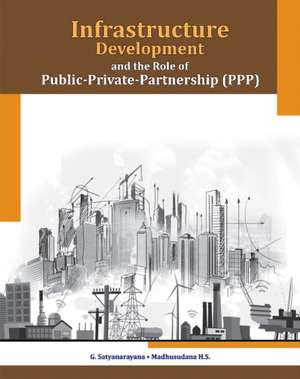Infrastructure Development & the Role of Public-Private-Partnership (PPP)
Autor Professor G Satyanarayanaen Limba Engleză Hardback – 2 aug 2017
Preț: 720.76 lei
Preț vechi: 812.18 lei
-11% Nou
Puncte Express: 1081
Preț estimativ în valută:
137.92€ • 144.29$ • 114.57£
137.92€ • 144.29$ • 114.57£
Carte indisponibilă temporar
Doresc să fiu notificat când acest titlu va fi disponibil:
Se trimite...
Preluare comenzi: 021 569.72.76
Specificații
ISBN-13: 9788177084504
ISBN-10: 817708450X
Pagini: 396
Dimensiuni: 190 x 250 x 36 mm
Greutate: 1.02 kg
Editura: New Century Publications
Colecția New Century Publications (IND)
ISBN-10: 817708450X
Pagini: 396
Dimensiuni: 190 x 250 x 36 mm
Greutate: 1.02 kg
Editura: New Century Publications
Colecția New Century Publications (IND)
Cuprins
Infrastructure Development & Upgradation Policy in India; Public Private Partnership (PPP) for Infrastructure Development; Energy Needs: Challenges, Strategies & Institutional Arrangements; Electricity Policy & Reforms; Coal Resources & Utilization; Petroleum & Natural Gas; Renewable Energy Sources; Atomic Power for Civil Use; Energy Conservation & Environment; Transport Sector: Deficiencies & Strategies; Indian Railways; Roads & Road Transport; Ports & Shipping; Civil Aviation; Telecommunication Services; Information Technology (IT) & IT-enabled Services; Broadcasting & Postal Services 17.1 Broadcasting Services 17.2 Postal Services; Economics of Special Economic Zones (SEZs); Special Economic Zones (SEZs) in India; Water Resources Management & Looming Crisis; Irrigation Programmes/Schemes; Rural Transport & Communications; Approach to Urban Development; Urban Housing & Slum Clearance/Development; Urban Transport Policy & Services; Urban Water Supply, Sanitation, Sewerage & Solid Waste Management; Index.
